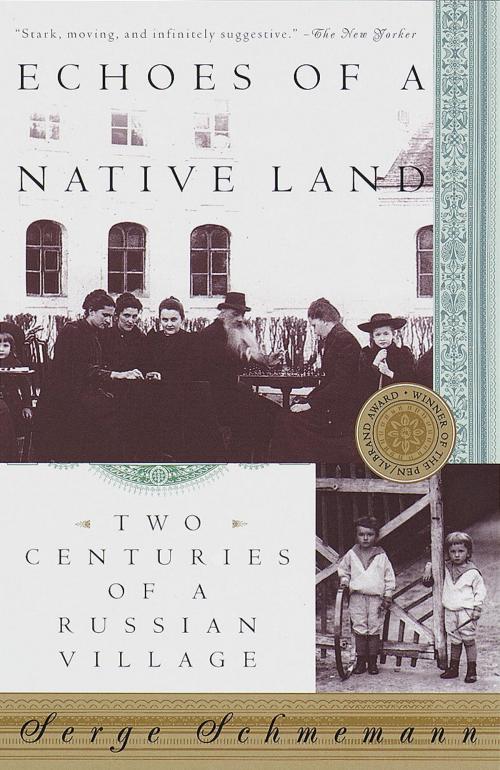Echoes of a Native Land
Two Centuries of a Russian Village
Nonfiction, History, Asian, Russia, Social & Cultural Studies, Political Science, International, Social Science| Author: | Serge Schmemann | ISBN: | 9780307766311 |
| Publisher: | Knopf Doubleday Publishing Group | Publication: | March 23, 2011 |
| Imprint: | Vintage | Language: | English |
| Author: | Serge Schmemann |
| ISBN: | 9780307766311 |
| Publisher: | Knopf Doubleday Publishing Group |
| Publication: | March 23, 2011 |
| Imprint: | Vintage |
| Language: | English |
Tracing the lives of his Russian forebears, Serge Schmemann, Pulitzer Prize-winning foreign correspondent for the New York Times, tells a remarkable story that spans the past two hundred years of Russian history.
First, he draws on a family archive rich in pictorial as well as documentary treasure to bring us into the prerevolutionary life of the village of Sergiyevskoye (now called Koltsovo), where the spacious estate of his mother's family was the seat of a manor house as vast and imposing as a grand hotel.
In this village, on this estate--ringed with orchards, traversed by endless paths through linden groves, overseen by a towering brick church, and bordered by a sparkling-clear river--we live through the cycle of a year: the springtime mud, summertime card parties, winter nights of music and good talk in a haven safe from the bitter cold and ever-present snow. Family recollections of life a century ago summon up an aura of devotion to tsar and church. The unjust, benevolent, complicated, and ultimately doomed relationship between master and peasants--leading to growing unrest, then to civil war--is subtly captured.
Diary entries record the social breakdown step by step: grievances going unresolved, the government foundering, the status quo of rural life overcome by revolutionary fervor. Soon we see the estate brutally collectivized, the church torn apart brick by brick, the manor house burned to the ground. Some of the family are killed in the fighting; others escape into exile; one writes to his kin for the last time from the Gulag.
The Soviet era is experienced as a time of privation, suffering, and lost illusions. The Nazi occupation inspires valorous resistance, but at great cost. Eventually all that remains of Sergiyevskoye is an impoverished collective.
Without idealizing the tsarist past or wholly damning the regime that followed, Schmemann searches for a lost heritage as he shows how Communism thwarted aspiration and initiative. Above all, however, his book provides for us a deeply felt evocation of the long-ago life of a corner of Russia that is even now movingly beautiful despite the ravages of history and time.
Tracing the lives of his Russian forebears, Serge Schmemann, Pulitzer Prize-winning foreign correspondent for the New York Times, tells a remarkable story that spans the past two hundred years of Russian history.
First, he draws on a family archive rich in pictorial as well as documentary treasure to bring us into the prerevolutionary life of the village of Sergiyevskoye (now called Koltsovo), where the spacious estate of his mother's family was the seat of a manor house as vast and imposing as a grand hotel.
In this village, on this estate--ringed with orchards, traversed by endless paths through linden groves, overseen by a towering brick church, and bordered by a sparkling-clear river--we live through the cycle of a year: the springtime mud, summertime card parties, winter nights of music and good talk in a haven safe from the bitter cold and ever-present snow. Family recollections of life a century ago summon up an aura of devotion to tsar and church. The unjust, benevolent, complicated, and ultimately doomed relationship between master and peasants--leading to growing unrest, then to civil war--is subtly captured.
Diary entries record the social breakdown step by step: grievances going unresolved, the government foundering, the status quo of rural life overcome by revolutionary fervor. Soon we see the estate brutally collectivized, the church torn apart brick by brick, the manor house burned to the ground. Some of the family are killed in the fighting; others escape into exile; one writes to his kin for the last time from the Gulag.
The Soviet era is experienced as a time of privation, suffering, and lost illusions. The Nazi occupation inspires valorous resistance, but at great cost. Eventually all that remains of Sergiyevskoye is an impoverished collective.
Without idealizing the tsarist past or wholly damning the regime that followed, Schmemann searches for a lost heritage as he shows how Communism thwarted aspiration and initiative. Above all, however, his book provides for us a deeply felt evocation of the long-ago life of a corner of Russia that is even now movingly beautiful despite the ravages of history and time.















